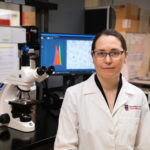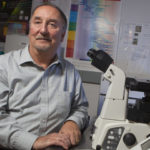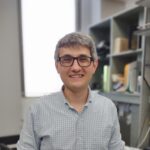Trainers

M. Belen Cassera, Department of Biochemistry & Molecular Biology
The Cassera Lab has been focused on the metabolism of human malaria parasites using state-of-the-art metabolomic approaches. Specifically, her lab contributed to the understanding of the isoprenoid biosynthesis pathway in asexual and sexual stages of P. falciparum. Broadly, her lab is focused on the isoprenome and the downstream uses of isoprenoids. These studies extend beyond malaria parasites and include the study of dolichol biosynthesis from isoprenoids and its link to glycosylation. In collaboration with a group at Virginia Tech, Dr. Cassera’s lab also leads an effort to discover novel antimalarials from natural products as well as their mechanism of action. The Cassera Lab uses an interdisciplinary approach, therefore trainees obtain excellent training in mass spectrometry, drug discovery, medicinal chemistry, molecular biology, and cellular biology.

Roberto Docampo, Department of Cellular Biology
Dr. Docampo’s laboratory explores the biochemistry of trypanosomes with an eye for the application of this knowledge to anti-parasite drug development. His laboratory discovered a novel acidic and calcium- and polyphosphate-rich organelle (acidocalcisome) present in organisms from bacteria to man. Parasites rely heavily on this organelle and focused drugs offer the promise to cure important global diseases. The laboratory provides training opportunities in biochemical, cellular and molecular parasitology, and has numerous collaborations with investigators at UGA, U. of Illinois, U. Michigan, as well as in Argentina, Brazil, Germany, Switzerland, UK, and Venezuela. Dr. Docampo was awarded a São Paulo Excellence Chair to establish collaborative work in Campinas, Brazil, where additional training opportunities for UGA trainees are available.

Drew Etheridge, Department of Cellular Biology
The Etheridge lab investigates host-pathogen interactions focusing on identifying parasite effector proteins and studying how they manipulate the host cellular machinery. Their studies concentrate on two different obligate intracellular parasites, Toxoplasma gondii and Trypanosoma cruzi. Dr. Etheridge discovered Toxoplasma effectors that suppress immune signaling pathways in infected cells. He has identified other novel parasite effectors and studies their influence on host cell biology. These include studies on T. cruzi aimed at understanding its interactions with the host. Dr. Etheridge’s group is developing and applying gene editing tools to study the molecular function of the cytopharynx, a specialized endocytic organelle in T. cruzi. These studies on such diverse parasites provide excellent training opportunities in evolutionary biology as well as gene editing, biochemistry and cell biology.

Donald Harn, Department of Infectious Diseases
His research focuses on how helminth glycans induce anti-inflammatory responses and on vaccine design and development. He identified a schistosome glycan, that drives immune suppressive and anti-inflammatory responses in vitro and in vivo. This glycan has potentially multiple, therapeutic uses for inflammation-based diseases. His laboratory is currently testing two schistosome vaccines in two, multi-intervention trials, to reduce prevalence and intensity of bovine schistosome infection in China and the Philippines. In the Harn lab, students and postdocs receive training in innate and adaptive immunology, including detection, isolation and cell biology of glycan binding receptors on APCs. They use FACS, RT-PCR and bioinformatics approaches to phenotype APCs and define signaling cascades. Trainees also gain experience in design and production of vaccines (schistosome and HIV-1).

Diego Huet, Department of Pharmaceutical and Biomedical Sciences
The Huet Lab focuses on the divergent metabolic adaptations of apicomplexan parasites. Dr. Huet was part of the team that pioneered a whole-genome CRISPR/Cas9 based mutagenesis approach that led to the identification of Toxoplasma genes essential for the lytic cycle. He used these whole-genome approaches to discover novel, essential, and divergent apicomplexan-specific subunits of the mitochondrial ATP synthase in T. gondii. In his new lab at the CTEGD, Dr. Huet aims to uncover the function of ATP synthase subunits in the Toxoplasma life cycle. Trainees will gain experience in developing, and using genome-scale experiments as well as how to use big data to discover novel players required for the parasitic life cycle of apicomplexan parasites.

Chester Joyner, Department of Infectious Diseases
Dr. Joyner conducts research on the parasite Plasmodium vivax, which is a major cause of malaria – a life-threatening mosquito-borne disease responsible for hundreds of thousands of deaths globally each year. P. vivax remains a major obstacle for malaria elimination, due to its ability to form dormant stages in the liver. These forms can become activated to cause relapsing blood-stage infections. Relapses in human patients remain poorly understood, because it is difficult to verify whether P. vivax blood-stage infections are due to new infections or relapses. Dr. Joyner also studies rhesus macaques infected with Plasmodium cynomolgi, a model of P. vivax, and assessed pathogenesis, host responses and circulating gametocyte levels during relapses. Compared to initial infections, relapses are clinically silent — no fever or signs of inflammation — and they are associated with a robust memory B cell response. Memory B cells are the immune system’s “reserve library” for antibody production. Relapse responses did result in the production of antibodies that were able to mediate clearance of parasites. Despite this rapid immune protection, sexual-stage gametocytes, which may be infectious to mosquitoes, continued to circulate.

Jessica Kissinger, Department of Genetics
Dr. Kissinger’s research group is interested in the biology of parasite genome evolution and data integration. Her approach is to apply molecular, computational and phylogenetic tools to the analysis of complete parasite genome sequences and associated metadata. Projects include the development of tools for data mining, data integration, comparative genomics and assessment of the phylogenetic distribution of genes. Students interested in working at the bench, at the computer, or both are welcome. Current collaborations are with scientists at Emory U., Georgia Tech, the U. of Pennsylvania, Notre Dame, the University of Liverpool (UK), Imperial (UK), the Federal University of Minas Gerais (Brazil), the Centro de Pesquisas René Rachou (Brazil) and Makerere University (Uganda), and have provided additional training and fieldwork experiences. Trainees from the lab have gone on to postdoctoral, faculty, and management positions in academia, as well as research positions in industry and the burgeoning healthcare genomics field.

Samarchith Kurup, Department of Cellular Biology
The research goal of Dr. Kurup’s laboratory is to decipher fundamental principles of immunity to liver and blood stages of malaria, using wild-type or humanized mouse models of malaria, and validate these findings with collaborative human studies. Understanding the role of blood-stage malaria in influencing long-standing immunity to vaccines and infections including malaria will help design a sustainable and effective therapeutic and vaccination strategy; especially in endemic areas. His laboratory focuses on anti-malarial immune responses and combines his expertise in immunology and parasitology, to advance the understanding of the host-parasite dynamics and contribute to the development of better therapies and vaccines against this major human pathogen. His eventual trainees will focus on whole animal and cellular and molecular malaria research.

Dennis Kyle, Departments of Cellular Biology and Infectious Diseases
Dr. Kyle’s research is focused on the discovery, development, and mechanisms of resistance to antiparasitic drugs. Currently, the Kyle lab studies malaria as well as pathogenic free-living amoebae. The Kyle lab has developed systems to grow liver stages of Plasmodium vivax, P. falciparum, and P. cynomolgi. They have developed high-throughput assays using high content imaging to discover new antimalarials effective against liver stages, including hypnozoites. The Kyle Lab also is a leader in the discovery of new drugs for neglected diseases caused by pathogenic free-living amoebae. His lab recently published a new treatment option for the brain-eating amoebae Naegleria fowleri and is leading a consortium of investigators from 6 universities in a new structure-based drug design effort. Trainees learn high-throughput drug screening, drug discovery, high content imaging, chemical biology, as well as medicinal chemistry. Collaborations with scientists from Institut Pasteur du Cambodge, Shoklo Malaria Research Unit (Thailand), Emory U, CDC, U Washington, Clemson U, Northeastern U, Seattle Structural Genomics Center for Infectious Disease, and USF provide additional training and fieldwork experiences.

Patrick Lammie, The Task Force for Global Health and Department of Cellular Biology
His research is focused on lymphatic filariasis and is based out of the Task Force for Human Health and at the CDC with studies centered on Wuchereria bancrofti infections in humans, primarily in Haiti, but also in other settings. His studies of the host-parasite relationship in filariasis are on the factors that influence host susceptibility to filarial infection and pathogenesis. Current experiments are focused on the direct and indirect effects of parasite products on lymphatic endothelial cells. In addition, trainees can participate in field studies (as capstone experiences) on monitoring parasitologic and immunologic correlates of exposure to Wuchereria bancrofti infection and/or applied research conducted to monitor and evaluate filariasis elimination programs. Dr. Lammie has long led the effort to eradicate filariasis from Haiti and also leads a BMGF consortium for operation research on integrated programs for NTDs, which offers widespread overseas opportunities for trainees and exciting capstone trips.

Silvia Moreno, Department of Cellular Biology
Her research centers on calcium signaling in Toxoplasma gondii during its lytic cycle, which is linked to its pathology, and discovery of new drugs that target the isoprenoid pathway. One area of interest is about finding the molecular mechanisms involved in the signaling events that lead to the stimulation of lytic cycle steps. Her lab developed a number of tools to study calcium in Toxoplasma, and has discovered a new chemotherapeutic approach by combining drugs that target parasite and host. Training opportunities exist in biochemical analysis of protein function to understand the role of enzymes, transporters and channels in the physiology of Toxoplasma. Collaborations with several chemists provide the opportunity for drug screening and chemical biology. Also, collaborations are in place in CTEGD and UGA and also at the U. of Michigan, John Hopkins U., Loyola Medical School, Rutgers Medical School, and U. of Vermont.

Vasant Muralidharan, Department of Cellular Biology
Dr. Muralidharan’s research group studies the biology of the human malaria parasite, Plasmodium falciparum. The lab deploys a variety of tools to understand the sorting and trafficking of proteins in the ER, protein transport into the apicoplast, trafficking of parasite exported effector proteins in the host cell, and the role of exported proteins in the intraerythrocytic life cycle of Plasmodium. The laboratory specializes in biochemical and genetic manipulations of Plasmodium coupled with cell biological and biophysical analyses of protein function. Excellent training opportunities are available in these diverse tool sets. The laboratory collaborates extensively with other groups within CTEGD and UGA as well as the CDC to translate fundamental knowledge into applications that can be deployed in the field. Thus, the group also provides opportunities for translational malaria research

Douglas Paton, Department of Infectious Diseases
The Paton lab is committed to developing new and novel ways to reduce global malaria burden, and studies the interaction of Plasmodium parasites with their Anopheles mosquito host, with an emphasis on the sub-Saharan African context where the vast majority of cases occur. We are focused on the role of Plasmodium mitochondrial function as a driver of parasite growth and development within the mosquito – a key developmental bottleneck and a strong target for novel disease-prevention technology. Their research is split between lab-based work with a strong focus on molecular biology, cloning, tissue culture, multi-omics, and experimental mosquito infection, and “boots-on” field work at SREL studying natural vector/parasite pairings, focusing on the interaction of parasites and mosquito during diapause (overwintering).

Alex Rosenberg, Department of Infectious Diseases
In the Rosenberg lab, they use Toxoplasma gondii as a model organism to study the sophisticated mechanisms this pervasive human eukaryotic pathogen uses to modulate the host immune system.

Tania Rozario, Department of Genetics
Dr. Rozario will join UGA and the Department of Genetics, January 2021. Dr. Rozario’s research focuses on the regulation of stem cells and germ cells that make tapeworms successful parasites. Tapeworms exhibit extraordinary feats of growth, regeneration, and reproduction through mechanisms that are largely unknown. Dr. Rozario has pioneered the resurrection of a long-neglected model tapeworm, Hymenolepis diminuta (rat tapeworm). Students will straddle the disciplines of genetics, cell biology, developmental biology, and parasitology. With an emerging model organism like H. diminuta, students will have the opportunity to develop new tools to tackle these old foes including transgenesis, single cell/nucleus sequencing, nanobody-based applications, and live imaging to name a few. She will support students with interests in a wide range of career pursuits. These include industry, medicine, education, technology development, government, non-profits, advocacy, communication, and journalism.

Robert Sabatini, Department of Biochemistry & Molecular Biology
The Sabatini Lab studies the biochemistry and molecular biology of parasitic organisms of the family kinetoplastida. Using trypanosomes as a model system the lab is examining the role of epigenetics on the regulation of kinetoplastid gene expression. The primary focus is characterizing the synthesis and function of the novel glucose-modified DNA base known as base J. Characterization of the enzymes involved in base J synthesis has implicated the modified base in regulating variant surface gene expression and immune evasion in T. brucei. The Sabatini lab has shown that base J regulates RNA Pol II transcription initiation and termination, that the localization and function of base J as an epigenetic mark involved in regulating Pol II gene and that expression is conserved among members of the kinetoplastida. This unique DNA modification found exclusively in these parasitic organisms, but not in their hosts, may lead to novel treatments of these diseases

Michael Strand, Department of Entomology
Dr. Strand’s research program investigates the interactions between insects, parasites and other microbes. Studies focus on mosquito species that vector pathogens of medical importance as well as other species. Current projects focus on: 1) interactions between microbial symbionts and their insect hosts, 2) function of the insect immune system, 3) regulation of growth and reproduction in mosquitoes and other insects, and 4) role of the microbiome in vector arthropod development. Dr. Strand has experience directing diverse approaches in the study of insect biology including methods in genomic and functional analyses. He also has active collaborations with several faculty at UGA and other institutions including Johns Hopkins U., Ohio State U., U. California, U. Wisconsin, U. Aberdeen (UK), Saga U. (Japan), Zhiqiang U. (China), U. Montpellier and Tours (France). In recognition of his contributions to the field, Dr. Strand was recently elected to the National Academy of Sciences.

Rick Tarleton, Department of Cellular Biology
His laboratory studies the immunology and pathogenesis of Trypanosoma cruzi infection and Chagas disease in mice, dogs, non-human primates and humans. The immunological focus has been primarily on CD8+ T cells. The Tarleton lab has generated genomic, transcriptomic and proteomic data sets for T. cruzi and tools for its genetic manipulation. Recently the laboratory has partnered with multiple pharmaceutical companies to generate drug screening assays and carryout drug development programs, including successful trials of clinical candidates in naturally infected non-human primates. The laboratory has for more than 20 years collaborated with studies on humans Chagas disease in Argentina, providing crucial data supporting the efficacy of treatments for those with chronic T. cruzi infections and generating new tools for monitoring treatment outcomes. They also develop attenuated vaccines targeted for canines (a major reservoir for human infection, in many parts of Latin America), and pioneered the discovery of biomarkers of cure.

Christopher West, Department of Biochemistry & Molecular Biology
Dr. West joined UGA from the University of Oklahoma College of Medicine. His laboratory studies the glycobiology of protozoans like Dictyostelium as well as the pathogens T. gondii and T. cruzi. The West lab employs diverse tools such as biochemistry, cell biology, NMR, analytical chemistry, mass spectrometry, and crystallography to study how protein glycosylation influences cellular regulation in these protozoans, including virulence of pathogenic eukaryotes. He also has active collaborations with investigators at the University of Buffalo. Dr. West currently serves as the Head of the Department of Biochemistry and Molecular Biology at UGA.
